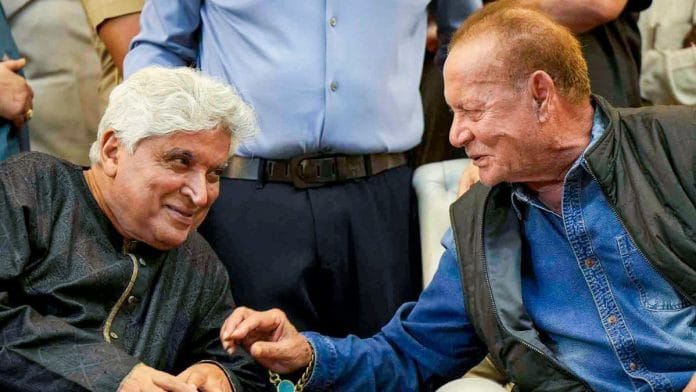Behind Bollywood’s Angry Young Man Amitabh Bachchan were two Angry Young Men. And behind them was an angry, despairing decade of India. It was the decade when the after-glow of the freedom struggle and nation-building had come undone. It was the decade that relied on Salim-Javed to channel its anger into entertainment.
There is a lot in Amazon Prime’s Angry Young Men that makes it leagues better than its counterparts. The documentary on Bollywood’s superstar screenwriters Salim Khan and Javed Akhtar avoids the usual pitfalls—it is not a boring sit-down interview, not a history lesson and definitely not a eulogy. Unlike Netflix’s 2023 docuseries The Romantics, where YRF told Yash Chopra’s story for him, Angry Young Men comes straight from the horse’s mouth. Salim-Javed take control of their legacy, and how.
But even more important is the larger message it has for Bollywood in 2024: Respect. Your. Writers. In an era where the industry is unjust to even the likes of Gulzar, Angry Young Men shows that writers aren’t mere transcriptors, and stories aren’t insignificant. It says—in loud, clear words and Eastmancolor—that Salim-Javed introduced the age of the writer, and it’s time to bring it back. Can’t say that I am not all for it.
Also read: Panchayat to Laapataa—villages on OTT are Gandhian simplicity or Ambedkar’s den of ignorance
Making anger beautiful
From their best and worst films to their funniest experiences and biggest mistakes, Salim and Javed aren’t interested in hiding from the audience. They are—or at least try to be—their most authentic self. This is how they want to be remembered. As the ‘angry young men’ who fell prey to arrogance but never lost faith in their work; as the angry young men who became a beacon of hope for many others like them in the strange and difficult 1970s—where it took six years to get a gas connection and standing hours in line for a ration card was a daily reality.
“They were anti-establishment in their ethos; they were angry, they were angsty and they created an angry, angsty, anti-establishment lead,” Karan Johar puts it succinctly in one scene.
With their intensely brooding trademark ‘Vijay’, they made anger an acceptable, valid, and even beautiful emotion. Salim-Javed’s angry young man, as screenwriter and filmmaker Varun Grover said in the documentary, was the “perfect representation of dissent”.
Also read: Bollywood is finally getting sports right. Chandu Champion to Soorma, Mary Kom
1970s, but make it Gen Z
Namrata Rao’s three-part docuseries on Amazon Prime Video taps into the life and times of Salim-Javed, laying bare their many virtues and foibles to a generation mostly unfamiliar with their early work—and that’s what truly makes it special. It gives a voice to the brilliant but faceless young writers behind film projects, and is a nostalgia trip for those who have grown up with Sholay (1975), Deewar (1975), Zanjeer (1973) and Seeta aur Geeta (1972).
The 45-minute episodes discuss their struggles, decode Sholay, Don (1978) and Immaan Dharam (1977), and even recall their 1982 split that shook the nation.
Most of all, it shows that India has found a new way to celebrate its film greats. After The Romantics and Modern Masters: S. S. Rajamouli (2024), and Kaagaz Ki Kashti (2017) and Mostly Sunny (2016), Angry Young Men shows that stale biopics are on their way to being dethroned by OTT documentaries. People want raw, real, and intimate glimpses into the lives of icons who shaped show business.
“[Documentaries have] now become an accessible form of entertainment packaged with intrigue for a large audience that seeks truth in their stories,” wrote Takshi Mehta in her article for The Established.
This packaging is especially evident in the stop-motion opening credits of Angry Young Men—an Amitabh Bachchan look-alike speeding in a Contessa, at times surrounded by animated ‘Gabbar Singhs’ and ‘Shaakaals’. As old-timey as it is palatable for Gen Z.
According to screenwriter Ankur Pathak who spoke to Mehta, “Pop culture has become a yardstick to measure and analyse what is happening in the country…especially for young people, who, unlike the earlier generations, have only seen life largely through a screen.”
Angry Young Men gets the brief, that way—repackage the glory of 1970s Bollywood for Generation Netflix. It’s an important history lesson for this generation—history of not just Bollywood but of India.
(Edited by Theres Sudeep)







ITS AMAZING THAT A DUO of writers could have impacted so greatly on the Indian fabric.
SADLY, SALIM AND JAVED PARTED———-LEAVING THE INDUSTRY DEVOID of some great artistry in writing..
there arent many writers of their calibre in bollywood today…
akhtar went on to become a brilliant lyricist-while salim khan promoted his sons in the industry.
yet, the bitterness remains about their infamous split